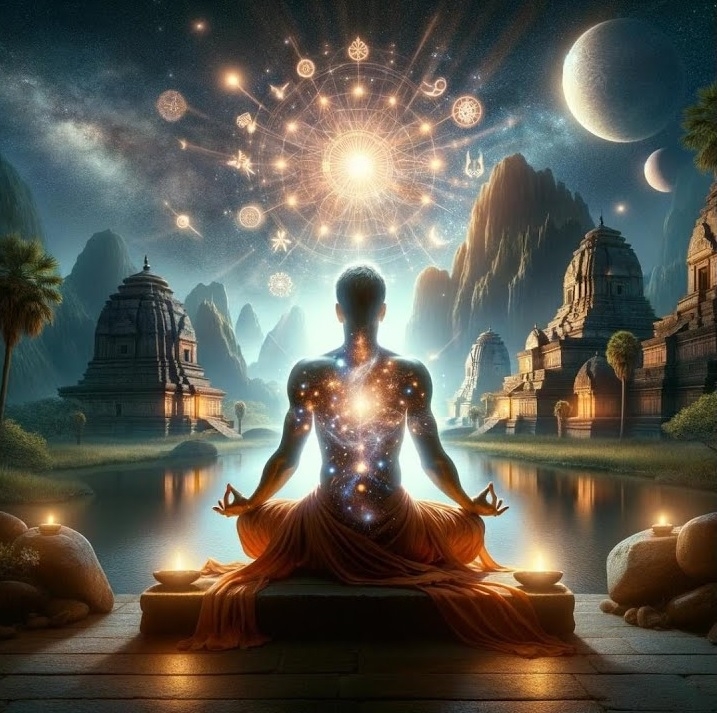Knowledge,the purifier
| Date :20-Apr-2025 |

By DR BHUSHAN KUMAR UPADHYAYA :
T
he grief of Arjuna in the first
chapter of the Geeta is
addressed by Lord Krishna
through counselling in the second
chapter and he suggests acquiring
equipoise by performing actions
without attachment. As the counselling advances, it takes the form
of serious philosophical and self
evolutionary discourse in the succeeding chapters.
The third chapter deals with
the Yoga of action and Lord
Krishna highlights that even
though the ultimate purpose is to
attain knowledge of consciousness, actions are an inevitable
evolutionary ladder which can not
be renounced. The fourth chapter
emphasises the significance of
knowledge combined with action
based upon its renunciation and
is called Jnana- Karma- SanyasaYoga. Lord Krishna propounds
that he first imparted the knowledge of Yoga to the sun in the
beginning of the creation and it
has been handed over subsequently to the next generations.
But in between it was lost and
now again Lord Krishna is making
it public.
Yoga is nothing, but a
collection of techniques which
bring out the divinity hidden in
human beings. There is a constant dialogue between Arjuna
and Lord Krishna. Arjuna is not
able to understand how Lord
Krishna imparted the knowledge
of Yoga in the beginning of the
creation millions of years ago.
To the query, Lord Krishna illuminates the theory of incarnation
necessitated by the circumstances
of different ages for the protection
of the good and destruction of the
evil. This is the dynamism of the
Vedic culture. Nothing is fixed, so
one parameter will not decide the
solution of the varied problems of
the coming ages. So new solutions are to be discovered in
every age. Elaborating the deeper
concepts of the Yogas of action
and knowledge, Lord Krishna
exhorts Arjuna to be free from
attachment, fear and anger.
Freedom from these emotions
establishes the practitioner into
the pure knowledge leading to
discover the divinity within.
According to the latest theory of
psychology, craving, fear and
anger are destructive emotions
and they need to be controlled.
The concept of Emotional
Intelligence is totally based upon
the management of these emotions. In this context Lord Krishna
brings out a great psychological
fact that in whatever way one
approaches him, he rewards in
the same way. This statement is
reinforced by the fact that what
we consider reality is nothing,
but the creation of our thoughts
and actions.The core values of
human beings are based upon
their attributes and duties.
The degeneration of this core
value gave rise to the caste system based upon birth. But the
Vedic culture originally does not
attach any value to birth. Craving
for the fruits of actions creates
bondage. So to perform the duties
without being attached establishes one in the flow state of the
mind. Actions are dynamic and
inscrutable. There are three types
of actions, good, bad and neutral.
It is not proper to get entangled
into the intellectual intricacies of
actions. It is better to perform the
actions without a sense of attachment. Actions performed with a
sense of service becomes a sacrifice. In order to prepare the foundation for detached and selfless
performance of duties, one needs
to first exercise control over sense
organs and mind.
Lord Krishna advocates numerous breathing and other techniques to control the sense organs
and human mind. Even today
experts are of the opinion that
breathing exercises or the
Pranayamas are the most effective tools to control the mind. By
the clear understanding and
knowledge regarding these subjects, one becomes able to free
oneself from the sorrow and suffering. Knowledge is the best
purifier. Devotion, self control and
knowledge lead to permanent
peace. Lastly Lord Krishna tells
Arjuna to cast doubts and march
ahead on the path of righteous
duty in the light of knowledge by
renouncing attachment to fruits of
actions.

(The writer is Former DG
Police & CG, Homeguards,
Maharashtra) ■
